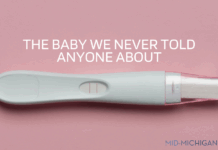My miscarriage is probably no different from yours…
My baby was here, growing, making plans, and then – just like that, my baby was gone. 
That morning, I went into the ultrasound appointment excited to see a heartbeat. I walked in smiling, proud to be pregnant, and ready to see my little blob on the screen. The ultrasound began. My smile turned to tears. My excitement turned to fear.
“Things don’t look like we want them to…”
“Not seeing the growth we should see…”
“…you don’t have cramps or bleeding?”
That was the day my nightmare began.
A follow-up ultrasound days later confirmed a miscarriage.
At that point, we had already told everyone. It was easier for me to cope when the truth was out and everyone knew. I mean everyone. My daughter’s teacher needed to know so she could help her if my daughter seemed off or sad. My friends needed to know so they understood why I couldn’t talk or why I canceled plans. Our family needed to know so we could rely on them for support. 
One main reason that I put our miscarriage on display: Miscarriage is common.
My OBGYN said as many as 30% of pregnancies will end in miscarriage. 30%! That is a lot. That is about 1 in 3 pregnancies. This statistic means you probably know a few people who have had a miscarriage. I am determined to share what happened to me and my family because the stigma surrounding miscarriage is unbelievable. People tend to “blame the victim” so to speak, which is unfair and unjustified.
When you think about miscarriage, here are some things you should know:
- Miscarriage is not the mom’s fault.
- The guilt is real, we do not need anyone else “figuring out” what caused the miscarriage.
- Sharing before 12-weeks did not cause the miscarriage. {Yes people are still very superstitious, I guess…}
- If we already have children, we are very aware of their existence and we know we are lucky to have them.
- In my case, IVF is the whole reason I’ve ever been pregnant. Unfortunately, with IVF, pregnancy is also more high risk in the beginning. Blaming IVF, however, is unnecessary… {and really backward when you think about it}.
- Faith or no faith, {unless you have that type of relationship with the person} you do not need to express your religious feelings on why this baby did not live.
- Yes, “it will be ok.” But, please… don’t say that to those grieving a loss. Will it really “be ok?” Probably, eventually. However, saying this minimizes what the couple is going through and it is insensitive. We have all said it to someone with good intentions, but I encourage you all to think about how it feels when “it will be ok” is said to you during a tough time.
- Are you curious about what symptoms the heartbroken mom may be feeling? Google it. Don’t ask her. Seriously. I hope that one does not need more explanation.
- You cannot fix it. Plain and simple. Do not try. What can you do? Say “this sucks.” Offer a shoulder to cry on. Send a message to check in on them. But, please do not try to “fix it.” It cannot be fixed.
While I continue navigating life after my first miscarriage, I am also dealing with many emotions: shame, guilt, hate, anger, sadness, and hopelessness. Each feeling is probably obvious in this blog because it is real and it is raw. This is what a miscarriage is like for me and after talking with others in the same position, it’s pretty par for the course.
Miscarriage happens. It is sad. It can be devastating.
Please try to be the friend who lightens the load, not the friend that adds to the burden.















